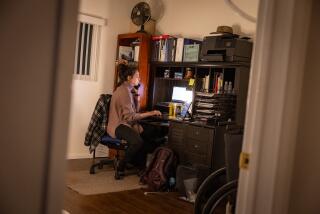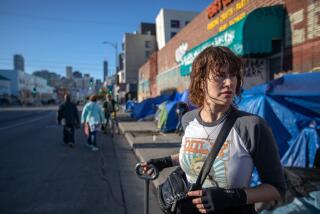Aching Bodies Mark Success of Benefit for UCI Poison Center
“Wasn’t that exciting?” wailed a woman as she slumped into a wheelchair, her face reddened and her hair knotted by wind that whipped across Chapman College’s track Sunday.
No one answered. Few of her cohorts had strength enough left to answer.
Ed Petrillo, director of the UCI Medical Center Regional Poison Center, surveyed the 90 wracked bodies strewn around the track infield at Chapman College.
“Just think,” mused Petrillo, “of all the sick calls at work on Monday, all the hurt bodies.”
Successful Undertaking
Clearly the outing--the 1985 Poison Prevention Hospital Olympics--had been a success.
Donning their running shoes and shedding at least some of their pride, about 90 amateur athletes who normally provide tender loving care for sick people at six Orange County hospitals had spent their day instead in herculean, albeit silly, efforts such as competitive bed making, wheelchair relay races and the daredevil “potato sack crutch sprint.”
By day’s end it was hard to tell if the participants’ bodies ached more from physical exertion or from belly laughs.
But their efforts raised about $3,200 in contributions to supplement the $191,000 annual budget of the regional poison center, a 24-hour-a-day nonprofit hot line at the UCI Medical Center that provides free advice for doctors, hospitals and the public when poison is ingested, often by children.
The poison center is credited not only with saving lives but also an estimated $500,000 a year in emergency room and doctor bills, according to Petrillo.
Field Donated
Pacific Mutual Insurance Co. sponsored the event, Chapman College donated its field and the college’s sports medicine students donated their assistance.
Despite the good intentions, sports purists could only have grimaced at Sunday’s schedule of events.
“I came up with the ideas for events, but not everybody liked them,” said Jack Culligan, who coordinated the competition for the center. “They threw out the bedpan toss on grounds of bad taste. We put in the mummy wrap, though.”
Competitors were chagrined to learn that the non-medical team entered by the Orange Jaycees won the overall scoring, boosted by a superlative showing in the bed-making competition.
“Those guys don’t even make beds at home,” groused a woman from a competing team.
Moments later, across the infield, Kevin Smith, a maintenance engineer from Anaheim General Hospital, granted reporters interviews and posed for photos as he explained his team’s poor time in the mummy wrap.
(For the uninitiated, the mummy wrap is a competition to determine how fast two people can wrap a third person from toe to head in 25 yards of hospital bandage, and then how quickly the wrapped person can hop to a finish line some distance away.)
Smith’s coeducational team finished well behind teams whose members were all of the same sex.
“Maybe it has something to do with the men getting their hands on the women and vice versa,” Smith suggested with a shrug and a grin.
For those who found risking life and limb in the gurney relay race was not danger enough, the event’s organizers raffled off a white-water rafting trip.
More to Read
Sign up for Essential California
The most important California stories and recommendations in your inbox every morning.
You may occasionally receive promotional content from the Los Angeles Times.










